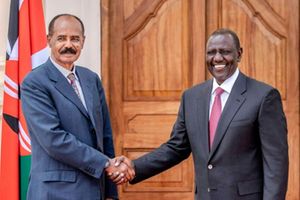
DN2
Premium
Is taking my husband’s name worth the hassle?
What you need to know:
- Even at present, a majority of married women still take up their husbands’ names.
- Is it mandatory for married women to change their names? Why do some people do it, while others prefer not to?
The history of women adopting their husbands’ names after marriage can be traced back to England. A story published by Forbes earlier this month quotes that “according to University of Illinois law professor Deborah Anthony, surnames were introduced to England with the Norman Conquest of 1066.
At this time, women’s rights were limited and they could not own property under common law. They could only be associated through their father’s names, and that right transferred to their husbands upon marriage.
With time, this took a religious inclination to include the scriptural notion of unity that having one name brings in a marriage, and was spread across Africa by missionaries and through colonialism.
Even at present, despite this custom slowly changing, a majority of married women still take up their husbands’ names.
So, why has this culture become so ingrained in our society, and are there changing trends? Is it mandatory for married women to change their names? Why do some people do it, while others prefer not to?
DN Parenting sought to explore these questions further by engaging people both the married and unmarried. We also get to hear from a legal expert, about the technicalities surrounding name change.
Rachel Karanja, 43, married: ‘I took his name, changed my ID’
When I met my husband, the name issue never came up. Not even after our wedding. I have been married for about 20 years now, and for the first few years, I retained my maiden name.
However, when I took his name, it was out of my conviction, and not something he had requested me to do. We were starting a company together, and I was going to be registered as the director, therefore I thought it would be better if I used his name.
The process was not very complicated. I went to the registrar of persons’ office, and all I required was my marriage certificate and my husband’s ID card. Then I filled out a deed poll declaring my intentions to take up his name in place of my maiden name.
At that time, my children were young. However, as time progressed, I came to learn the value of someone’s parents, as a parent myself.
So despite my ID having my husband’s name, I introduce myself with my maiden name on top as well. I do this to honour my departed father.
I am also a believer in women having their own identity, and I feel like my maiden name helps me maintain that.
Sometimes the traditions we follow can be twisted for selfish interests, and matrimonial names can be used as a means of oppression in a marriage, where the men feel like they own the women, just because of a name. Couples must have an honest discussion about the name change.
Faith Muli, 26 – not married: ‘I wouldn’t compromise my identity’
Finding lasting love is a blessing. To have a companion to share your life with, someone in your corner no matter what. In relationships, we have some aspects that we are not willing to compromise. Mine is taking up my husband’s name.
Some argue that a woman taking up a husband’s name is not only a sign of love but also unity. I do not believe I need to take my husband’s name to show my love for him, as there are countless other ways to show that.
This is a tradition that was adopted at a time when women were viewed as property, and men had absolute power over women. To think that centuries later we are still carrying on with it, is almost appalling, especially in instances where this is forced on women.
As a woman, I want to maintain my own identity, even in my marriage, and part of that is keeping my maiden name.
The realities of our times have also changed, compared to when this tradition was birthed.
Take for instance a young woman who owns a company, or businesses registered in their name.
Back then that was not even remotely heard of, but this is a reality for many young women today. By mandating them to change their name, you are subjecting them to a long and tedious administrative process, which is unnecessary. I want to keep the business in my own name, as a measure of my own hard work and success that does not have to be associated with anyone else.
I have also heard a common argument about the security that it gives a woman in her matrimonial home.
My father died when I was very young, and my mother had not taken up his name. However, it is not having his name that protected her inheritance, but rather their marriage certificate, and having in-laws who respected their marriage. After all, some women suffer a lot at the hands of their in-laws, despite having their husbands’ names.
Another concept is that of divorces and separations. While we do not get into marriages to fail, we must remain cognizant of our reality, which is that divorce rates have significantly gone up. In the unfortunate event that this happens, the woman having her own legal identity eases the process.
The bottom line is, that we are living in different times, and just as the stature of women in society has evolved, so must this. It takes much more than a name change to build a successful and happy marriage, and that is what we should focus more on. As to my legal identity, that is not something I am willing to compromise on.
Esther Wanjiku, 47 – married: ‘It didn’t seem necessary for me to change my name’
Even though I did not change my name when I got married, I do not necessarily view it as a bad thing. When I said ‘I do’ 17 years ago, the issue of taking up my husband’s name never came up. So I decided to keep my maiden name, as a sign of the great love I had for my father. And since I had a marriage certificate to prove our union, the rest did not matter much.
If the issue came up and was a point of contention, I think I would have been agreeable to doing it.
The idea of a marriage working because of having one surname is a bit far-fetched for me, as almost two decades later, I am still with my husband. Some women might find leaving their maiden name not only gives them a sense of security but also stability. Like a final affirmation that they belong.
However, for those people who get enjoined through co-habitation, a change of name might not be as important, as officiating a marriage. That is what is recognised by law as evidence of marriage, above everything else.
I have no strong feelings towards supporting, or opposing the matter, as everyone’s situation is unique, but the most important thing is that there is an understanding between couples about it, so that no party feels slighted.
It might seem like a small issue in retrospect, but if there is something I have learned in my years in marriage, it is the little things that matter. So, despite having not discussed it prior, I would advise young couples to have a discussion before, as times are also changing and different generations have varying takes on life.
Erick Kamau, 26 – not married: ‘I would be honoured if she took my name’
As a young man with the hope to settle down in marriage one day, I like being awake to the current times we live in. I would have no contention with a woman wanting to take up my name, I would be honoured actually. However, it is not something I have huge expectations of or a deal breaker.
Given the patriarchal roots of this tradition, I would understand why some women view it as a means of oppression. Besides this, some years back women would marry young, and take their identity cards late. This meant that taking the ID with the husband’s name was much easier.
Society is evolving though, and change is no longer an option. Time and culture are dynamic, so despite this tradition persisting, I feel like it will keep diminishing slowly.
Culturally, we have opened up more, and people are intermarrying more across various cultures and ethnicities.
By retaining their names, women not only maintain their identity but also a part of their culture.
This is important, as in most traditions, the children will automatically take up the name and traditions of the father.
Lawyer’s perspective: ‘A name change might raise issues when it comes to inheritance’
Eric Mukoya , a lawyer, notes that name change after marriage is not a legal requirement, and should only be done out of free will. It is rather a social arrangement by religious institutions to make marriage work.
Traditionally, women are rarely seen as just women – they are either someone’s wife, mother, daughter, or sister. Marriage, however, does not reduce a woman’s individuality, and part of that is her identity.
The process of changing a name in Kenya can be viewed as quite tedious. However, it is so by design. Someone’s identity has many implications, for instance, when it comes to security and threat mitigation, culpability for breaking the law, and even being able to track a person for such.
Therefore, when you initiate a name change, the government needs to understand your intentions and that is why they take you through that long process. The laws governing this process are contained in the Registration of Persons Act 2021.
When a baby is below two years, parents can change his/her name with ease. However, past this age, any name change is initiated by filling out a deed poll.
You will also need to provide valid reasons why you want to change your name, and upon satisfaction with the reasons provided, then the registrar will accept, or decline the name change request.
In marriage, this is a bit easier, as the evidence required is your marriage certificate and your husband’s ID.
The implications of changing a name will vary, depending on an individual’s situation. For instance, if you are applying for jobs, then your school certificates will have your maiden name, and your identity card and bank account might have your marriage name.
In such a case, you might find yourself having to take a lot of affidavits to prove your identity.
In case of a divorce or separation, you might want to change your name back as well, and this is possible. The law does not curtail you from your identity, but you will have to contend with administrative difficulties.
A name change might also raise issues when it comes to inheritance, where the property or estate being inherited is from your father.
When it comes to the argument of security, it is important to note that there are two aspects to it; the social and the legal aspect. The latter is only concerned with what the law recognises as proof of marriage, which is the marriage certificate.
The social aspect, however, is the one that created the desire to associate with the man’s name, to alleviate some fear of belonging.
It is also seen as a sense of authority; by the man to show dominance, and for a woman to ascertain her position as the only one in the man’s life.
It is important to note that cohabitation is not marriage. In case of death, therefore, a woman can get disinherited easily.
However, a court of law can grant you inheritance or maintenance from the estate of the deceased under the presumption of marriage law.
Through the Evidence Act, section 119 -Presumption of likely facts, a widower can be allowed to call witnesses in court such as close friends, family, or in-laws, to testify to the known union of the two.





